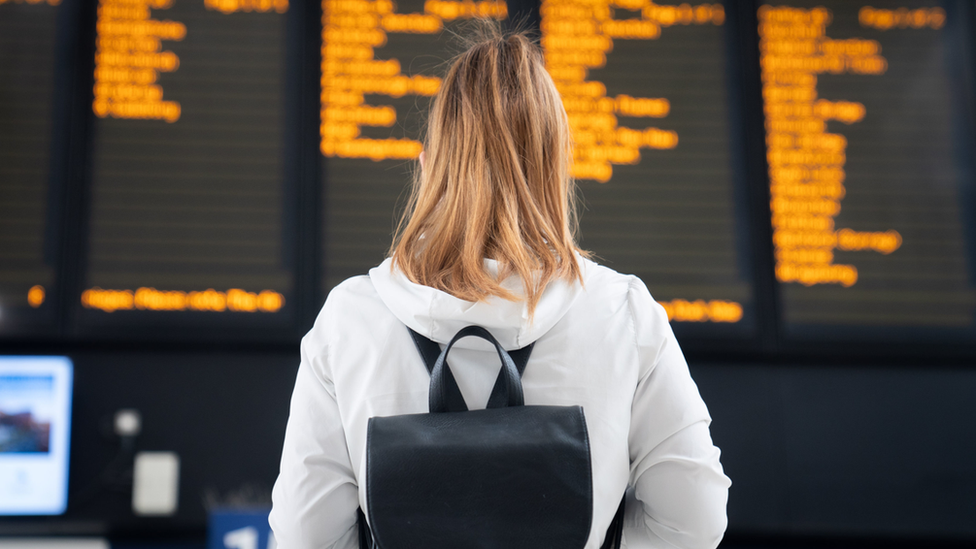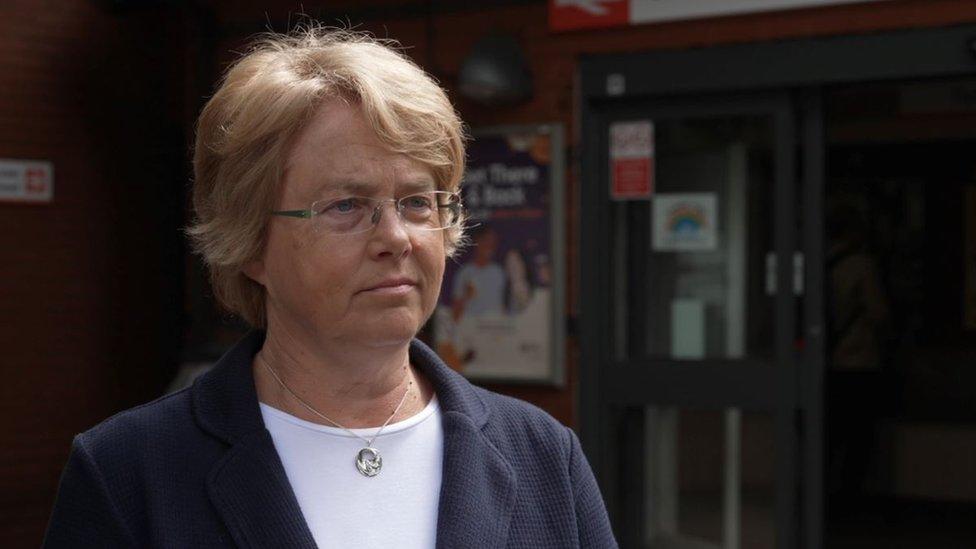Train strikes: Disruption expected as rail workers walk out
- Published
- comments

Members of the RMT union at 14 rail companies are striking on Thursday as part of a long-running dispute over pay, jobs and conditions.
Passengers should expect large areas of the rail network to have little or no services, National Rail said, external.
The operators are based in England but some run services into Wales and Scotland.
In addition, train drivers in the Aslef union are not working overtime at 15 train companies between 17 and 22 July.
The extent of Thursday's RMT disruption will vary around the country, with some services starting late and finishing much earlier than normal.
There will be further strikes on 22 and 29 July.
Aslef's action, which will run until Saturday, is not a full strike but could cause some reduced timetables and last-minute cancellations.

Meanwhile, rail users have sent in 100,000 responses to a consultation over proposed ticket office closures in England.
The plans, which have faced criticism, are the latest flashpoint for train operators, which are also in a deadlocked dispute with unions over reforms.
Following the impact of the Covid pandemic, the industry faces pressure from the government to cut costs.
The latest proposals presented by the Rail Delivery Group (RDG), which represents train operators, included a backdated pay rise of 5%, followed by 4% this year.
This was in exchange for changes to working practices to be discussed with individual operators.
The dispute reached an impasse when the RMT rejected the offer in April. The RDG continues to call on the union to give its members a vote on the offer.
RMT boss Mick Lynch said "there are conditions in this offer that we can't live with", and ministers had not granted the operators permission to negotiate further.
But RDG boss Jacqueline Starr said the existing "very good" offer remained on the table, and the RDG was "very open to continuing conversations".
She added that the industry "can't afford for the industry to stand still", and would "continue with reform".
Closures
Train firms are pressing ahead with plans to close the majority of ticket offices in England.
The plans have faced criticism from disability campaigners and unions which are trying to block the reforms.
The Transport Focus watchdog called the response to its consultation, which is running until Wednesday 26 July, "huge" so far.
However, it said it was too soon to say whether the responses were mostly for or against the proposed closures.
Inside London, the consultation is being run by London Travelwatch.
Five Labour mayors are preparing a legal challenge, saying the 21-day timescale for the consultation was "totally inadequate".
Under the proposals, some ticket kiosks would remain in large stations, but elsewhere staff will be on concourses to sell tickets, offer travel advice and help people with accessibility.
However, Mr Lynch said that some stations would "only get staff for two hours, so if you're an elderly person travelling off-peak, there will be no-one there to assist you".
He added that 2,300 station staff are "not being moved from behind glass to assist passengers" but instead would be made redundant "en masse".

Campaigner Natasha Winter says ticket office closures will affect people who can't use new technology
Last week, Commons Speaker Lindsay Hoyle challenged rail minister Huw Merriman over the planned closures.
Mr Merriman had said "no currently staffed station will become unstaffed" as a result of the proposals.
But Mr Hoyle said the railway station in his constituency, Chorley, would effectively become unstaffed after 4pm.
'Helping customers'
Ms Starr said on Wednesday that the planned closures were "about people bringing people out from behind the glass screens".
Staff would be "on the concourse, enabling a conversation with customers, enabling them to assist customers, have a dialogue, and also, when necessary, helping customers to navigate the ticket vending machines which would be on the platform," she said.
Ms Starr insisted the industry was "genuinely listening to the accessibility groups that have a number of concerns", and she was having meetings with the rail minister and disability groups.
When asked by the BBC on Wednesday if she would promise that every ticket currently available at ticket offices could be found on at a machine or online, including the least expensive, Ms Starr replied: "I'm not going to make promises that I can't keep."
She added: "We are working hard to ensure that where possible, every ticket is offered by a ticket vending machine".
Campaigner Natasha Winter, who set up the Save Stourbridge Ticket Office group, said when she found out about the consultation on the ticket office closures she was "absolutely outraged".
"We're talking about punishing and penalising the members of society who maybe can't use new technology," she said.
"The station is going to become less user-friendly for the whole community," she added.
Related topics
- Published9 May 2024
